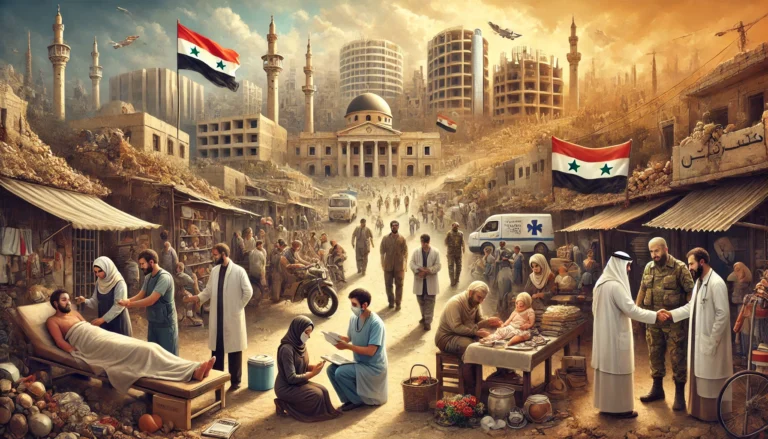Syria, a country with a rich history and cultural heritage, has endured over a decade of conflict, leading to severe humanitarian, political, economic, and social crises. Citizens face numerous challenges across various sectors, including governance, legal systems, business, healthcare, education, and the environment. This article explores the most common complaints in Syria and their impact on daily life.
1. Political Complaints in Syria
Syria’s political situation has been one of the most complex and controversial in the modern world.
- Authoritarian Governance: The government has been accused of suppressing political opposition and limiting democratic freedoms.
- Corruption: Transparency International ranks Syria among the most corrupt countries, with public funds often misused by political elites.
- Lack of Political Representation: Many citizens feel politically marginalized, with no real opportunity for participation in governance.
- Human Rights Violations: Reports from international organizations highlight widespread human rights abuses, including arbitrary arrests and forced disappearances.
Source: Transparency International, Human Rights Watch, Amnesty International
2. Legal Complaints in Syria
The legal system in Syria has faced criticism for a lack of independence and fairness.
- Lack of Judicial Independence: Courts are often influenced by political authorities, leading to biased rulings.
- Unfair Trials: Many cases, especially those involving political detainees, are handled through military or emergency courts.
- Property Seizures: Many displaced Syrians have lost their homes due to government expropriations and legal obstacles to reclaiming property.
- Legal System Collapse: Many courts and legal institutions have been destroyed or are non-functional in conflict-affected areas.
Source: Amnesty International, Syrian Network for Human Rights
3. Business Complaints in Syria
Syria’s economy has been severely affected by war, sanctions, and corruption.
- Hyperinflation and Currency Devaluation: The Syrian pound has lost most of its value, making basic goods unaffordable.
- Unemployment Crisis: Many businesses have shut down due to war and economic instability, leaving millions jobless.
- Corrupt Business Practices: Government-affiliated individuals control key industries, limiting opportunities for independent entrepreneurs.
- Sanctions and Trade Restrictions: International sanctions have restricted economic growth, limiting imports and exports.
Source: World Bank, Syrian Economic Forum
4. Health Complaints in Syria
The healthcare system in Syria has been devastated by conflict, leading to severe public health challenges.
- Destroyed Hospitals and Clinics: Many medical facilities have been bombed or are non-operational.
- Shortages of Medicine and Equipment: Essential medicines, vaccines, and medical supplies are often unavailable.
- Lack of Medical Staff: Many doctors and healthcare professionals have fled the country due to the war.
- Outbreak of Diseases: Poor sanitation and lack of clean water have led to the spread of diseases such as cholera and hepatitis.
Source: World Health Organization (WHO), Syrian Ministry of Health
5. Social Complaints in Syria
Social issues in Syria are deeply rooted in war, displacement, and lack of basic services.
- Mass Displacement: Over 6 million Syrians are internally displaced, while millions more have fled as refugees.
- Lack of Basic Services: Many areas suffer from power outages, water shortages, and lack of public transportation.
- Gender-Based Violence: Women and girls have been disproportionately affected by war-related violence and exploitation.
- Discrimination Against Refugees and IDPs: Many displaced Syrians face discrimination and lack access to jobs and education.
Source: UNHCR, Syrian Observatory for Human Rights
6. Educational Complaints in Syria
The education sector in Syria has suffered immensely due to war and economic decline.
- Destroyed Schools: Many schools have been bombed or repurposed as shelters for displaced families.
- Teacher Shortages: Many educators have left Syria, leading to a decline in education quality.
- Lack of Learning Materials: Books, computers, and other educational resources are scarce in many schools.
- Disrupted Education: Many children have missed years of schooling due to conflict, displacement, and economic hardship.
Source: UNESCO, Syrian Ministry of Education
7. Environmental Complaints in Syria
Syria’s environment has suffered from pollution, war-related destruction, and climate change effects.
- Water Scarcity: Many regions face severe droughts and a lack of clean drinking water.
- Deforestation and Land Degradation: Conflict and illegal logging have destroyed large forested areas.
- Pollution from War: Bombings, chemical attacks, and industrial destruction have caused significant environmental damage.
- Waste Management Crisis: Many cities struggle with garbage collection and sewage treatment, leading to serious health risks.
Source: Syrian Environmental Protection Agency, Greenpeace
8. Emotional Complaints in Syria
The psychological and emotional toll of war has been devastating for the Syrian people.
- Trauma and PTSD: Millions suffer from post-traumatic stress disorder (PTSD) due to war-related violence and displacement.
- Family Separations: Many families have been torn apart due to migration, detention, or death.
- Increase in Domestic Violence: Economic stress and war-related trauma have contributed to rising cases of domestic violence.
- Mental Health Stigma: Many people struggle to access psychological support due to social stigma and a lack of mental health services.
Source: WHO, Syrian Psychological Association
Conclusion
Syria continues to face an unprecedented number of challenges across multiple sectors. While humanitarian aid and international efforts are attempting to provide relief, long-term solutions require political stability, economic recovery, and rebuilding public institutions. Addressing these issues is crucial for Syria’s future and the well-being of its people.

